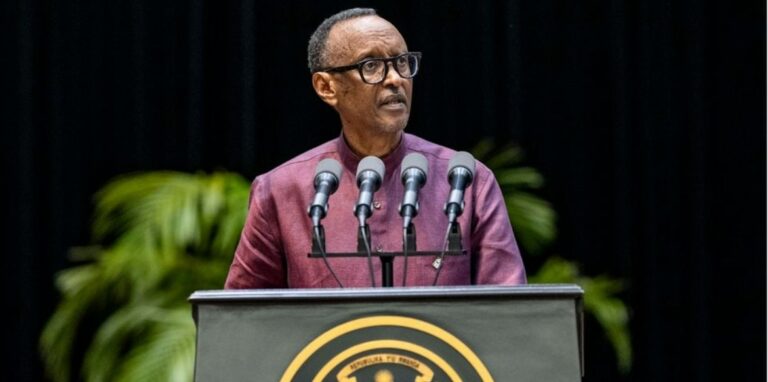Rwandan President Paul Kagame has launched a scathing critique of his Congolese counterpart, Felix Tshisekedi, alleging that Tshisekedi has never legitimately won a presidential election.
Kagame made these remarks on Thursday during a meeting with defense attaches in Kigali, marking the latest escalation in strained relations between Rwanda and the Democratic Republic of Congo (DRC).
“The person who is causing us problems in this situation between Rwanda and DRC has never, twice, been elected,” Kagame asserted.
“This man, Tshisekedi, was never elected. The first time, he was not elected at all. Only that you [Western countries] don’t talk about it publicly. I am talking about it publicly.”
Kagame further questioned the credibility of Tshisekedi’s electoral victories, stating, “The second time, nothing [an electoral victory] happened, and you know it.
So, what values are you telling us that you beat some people for and others you don’t know what to do?”
Worsening Relations and Mutual Allegations
Kagame’s comments come amid growing hostilities between Kigali and Kinshasa, rooted in accusations of mutual support for armed groups in eastern DRC.
Rwanda has been accused of backing the M23 rebel group with arms and troops, while DRC is alleged to support the Democratic Forces for the Liberation of Rwanda (FDLR), a militia linked to the perpetrators of the 1994 Rwandan genocide.
These tensions have exacerbated regional instability, drawing criticism from international observers and complicating efforts to foster peace in the volatile Great Lakes region.
Electoral Controversies
Tshisekedi’s leadership has long been shadowed by allegations of electoral fraud. After winning the 2023 general election with 73% of the vote, according to the country’s electoral body, his victory was contested by opposition leaders, including Martin Fayulu, Moïse Katumbi, and Joseph Kabila.
This is not the first time Tshisekedi’s legitimacy has been questioned. Following the 2018 presidential election, two independent data leaks undermined the official results declared by the Independent National Electoral Commission (CENI), which had proclaimed Tshisekedi the winner with 38.57% of the vote.
The leaks, one from CENI’s internal database and another from the Catholic Church’s Episcopal Conference (CENCO), painted a different picture.
CENI’s leaked data suggested Martin Fayulu won with 59.42% of the vote, while Tshisekedi trailed at 18.97%.
CENCO, which deployed nearly 40,000 observers on election day, corroborated these findings, estimating Fayulu’s victory at 62.80%.
Despite these discrepancies, the courts upheld Tshisekedi’s victory, solidifying his position as president.
Kagame’s Critique of Western Diplomacy
During his address, Kagame criticized Western nations for their selective approach to governance issues in Africa.
“You know it [electoral malpractices in the DRC]. You know it. This is why I was saying, it doesn’t matter evidence, it doesn’t matter facts or claim. It is just what you think applies to you or benefits you,” Kagame stated.
He urged diplomats to prioritize consistency and fairness in addressing governance challenges across the continent.
“We all need peace. Rwanda actually needs peace more than anybody. Because we have already tested the lack of it and the meaning of that,” he added, referencing Rwanda’s own troubled history of conflict and genocide.
The Road Ahead
The escalating war of words between Kagame and Tshisekedi reflects the deepening divide between Rwanda and the DRC.
As both nations accuse each other of fueling violence through proxy militias, the prospects for diplomatic reconciliation appear dim.
International pressure on both sides to de-escalate and address the underlying causes of regional instability will be critical in averting further conflict.
However, the accusations of electoral fraud leveled against Tshisekedi add another layer of complexity, potentially undermining Kinshasa’s credibility in negotiations. For now, the tensions between the two nations underscore the fragility of governance and peace in the region.

